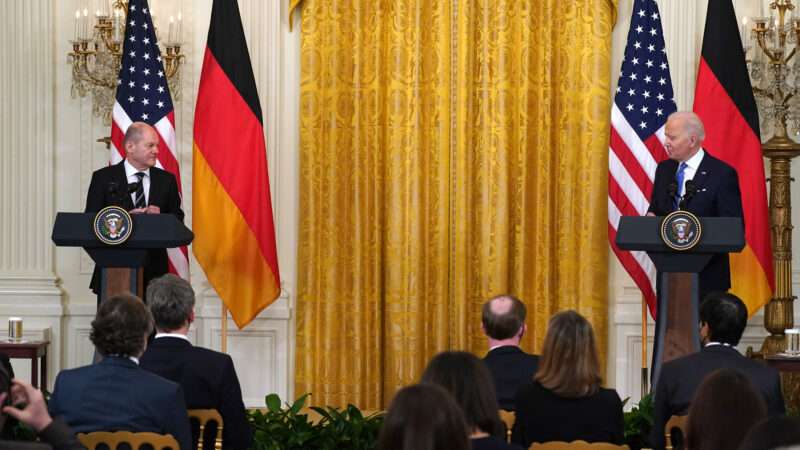
President Joe Biden met with German Chancellor Olaf Scholz for the first time today to dissuade American fears that Germany is an "unreliable partner" in the possible Russia-Ukraine conflict. It's still unclear what role the largest economy in the European Union will play if Russian forces invade Ukraine.
Previously, Germany has received harsh criticism for its "soft treatment" of Russia as its troops gather at the Ukrainian border. Until recently, Chancellor Sholz has been reluctant to clarify what exactly Germany will do if Russia invades Ukraine. Biden attempted to put that doubt to rest in a press conference on Monday by declaring, "Germany is an incredibly reliable ally."
When countries like the United States, France, and the United Kingdom sent weapons to Ukraine, Germany sent helmets—which Scholz insisted Ukraine really needed. This led to strong criticism of the German leader from both sides of the aisle. Sen. Richard Blumenthal (D–Conn.) thinks Germany has been "missing in action," and Sen. Robert Portman (R–Ohio) questioned why Germany hasn't allowed planes full of military aid for Ukraine to fly through German airspace.
The Chancellor pushed back at this narrative by telling The Washington Post, "The reality is that Germany is the biggest NATO partner in continental Europe, that we are continuously strengthening our military forces, that we are a very good partner." By embracing the ethos that Germany is a largely pacifist nation, Scholz points to the German tradition of not sending weapons into countries in crisis.
There is one wrinkle in Germany's relationship with Russia that has much of the world on the edge; the Nord Stream 2 pipeline. Referred to as an "existential threat" to Ukraine, the natural gas link between Germany and Russia will make the former largely dependent on the latter to meet energy demand. When asked if the plug on Nord Stream 2 would be pulled if Russia invades Ukraine, Scholz vaguely responded, "We are absolutely united in our decision-making, and we will take the necessary steps together." Scholz also refused to name the Nord Stream 2 pipeline outright. The U.S. has never imposed sanctions on an economy as large as Russia's, and this partnership between Germany and Russia further complicates how sanctions could be carried out.
"The strongest sanctions ever seen" will be imposed on Russia if they invade Ukraine, claims Biden and Germany has agreed to this plan. But, no specific details of the sanctions have been released to the public.
President Biden & Chancellor Scholz agreed that when it comes to Russian aggression, "diplomacy is the best way forward on all sides," and it appears that their French ally is on the same page. On Monday, President Emmanuel Macron tweeted: "Let us start building a response that is useful for Russia, useful for all of our Europe, a response that helps us avoid war and build all the elements of trust, of stability, of visibility. Together."
On February 15, when Chancellor Scholz meets with President Putin, the world will see if Germany will stick to its promises.
The post NATO Unity Is Put to the Test appeared first on Reason.com.







